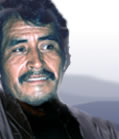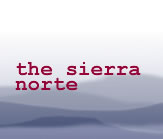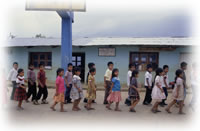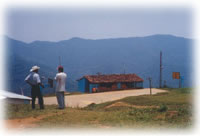 |
 |
||
 |
|||
|
RELATED THEMES development health identity social change traditional skills OTHER LOCAL THEMES BACKGROUND |
education
More than one narrator remarks on the strictness of the educational regime: "The teachers were very hard . they beat you, didn't they? - they don't do this now. They used to throw the board rubber and chalk at you, they hit you with a ruler, they were hard. [but] we did learn a lot during our childhood." (Mexico 12). There is some ambivalence about formal education. One 62-year old man (Mexico 2) says: "Now the traditions are being forgotten. The older people still carry on like the forefathers did, but the young people have their own way and.it's not important to them. Now there's studying and they all know how to read and write and so.they don't take any notice and they don't obey what the older people say. before, there weren't schools, there wasn't anyone who could read, and.[people] did as the elders said." Another narrator (Mexico 12), who went on to university, recognises there are disadvantages as well as benefits to formal education: "Maybe the hardest thing in the primary [school] is that they didn't let you speak Zapoteco. If the teacher heard us speaking Zapoteco they drew attention to us and they sent for our parents and gave them a punishment too." Today there seems to be a move to provide for teaching in both Spanish and Zapoteco, part of a more general revival of indigenous identity. This same narrator is part of a project in Yavesía (echoed in other regions of the Sierra) to re-establish local cultural education: "We have a proposal that we hope to put into action as soon as possible. we are going to revive the way in which we adults, we older people were educated.so that the children learn about the village - what there is here - its history, its struggle and its life. So the proposal is very simple: we shall go one day a week and bring together the children of fifth and sixth year from the primary school, and the first, second and third years from the secondary school.[in] an open class where anyone from the village can go to share his or her stories, legends, traditions, cargos, all of that, with the students." (Mexico 12). The traditional doctor interviewed in Tiltepec (Mexico 4) speaks of the importance of passing on knowledge and training: "I get sent for by other communities to train other promoters.we have to spread what we learn, what we've learnt in the Training Centre.we share everything.we know, so that this knowledge is spread to colleagues from communities that don't have the services that we have." And the newly-launched ecotourism project in Ixtepeji is an opportunity to provide vocational training to young people: "We [have] received some training in mammalogy, entomology, ornithology [and so on].lots of people say, well, 'But what type of fauna or flora is there?' Then one can.explain it.It is the same concerning the plants, the flowers.medicinal plants.which plants are edible." (Mexico 26). quotes about education".I've been a traditional medicine healer for 36 years and a promoter for 16 years. I learnt from my grandmother and began to treat when I became a mother. I had two daughters and I saw that it was necessary to treat them.[My grandmother] learnt from a woman, a grandmother who was from San Miguel Amatlán, who also learnt as a girl." ".[At school] they taught us how to work but they also taught us that Spanish is the most important, that to get ahead in the big cities it was the most important and well, they took many things away from us, for example.the [Zapotec] language." "I finished primary school.but I didn't manage to study more as my parents were poor... People used to say you shouldn't send girls to school as they wouldn't end up with a cargo (unpaid community position), but it isn't like that now because.women and men are equal now and can carry out whatever cargo. It wasn't like that before unfortunately; we didn't have support to continue studying like there is now." "This is the education the community gives us: that one must respect and comply with the cargos (unpaid community positions), the asambleas (community parliaments), the assigned tasks and a series of requirements that there are in the community. I mean, there are two types of education and maybe the strongest is that of the community, because that is where one lives." "Every day I had to draw up marriage certificates, death certificates, birth certificates, these were all part of the [cargo] job. You do all the application forms and work that people in the community need doing. this taught me more [than school]." "I can remember many things from my childhood, but maybe the most important thing that I remember is the teaching of my grandfather. Because my father worked away - he was one of the first migrants from Yavesía - so I mostly remember the teachings of my grandparents." ".if one doesn't have any qualifications or something from Mexico City, one can't get any work." |
|
 All narrators appear to have received some education at primary level, although the older narrators speak of school facilities that were basic. For example, this farmer from Ixtepeji (Mexico 24) recalls:
All narrators appear to have received some education at primary level, although the older narrators speak of school facilities that were basic. For example, this farmer from Ixtepeji (Mexico 24) recalls:  Secondary classes have not, it seems, been available in many communities; for example in Tiltepec (Mexico 5):
Secondary classes have not, it seems, been available in many communities; for example in Tiltepec (Mexico 5):